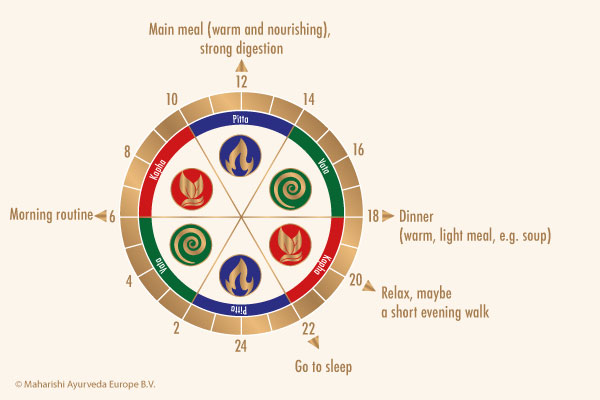Restlessness, too much input, stress, the feeling of a “heavy stomach” – these are just a few of the many reasons why we don’t sleep well or feel rested in the morning. Often, the reasons for poor sleep can be traced back to our daily, familiar routine. Ayurveda expert Dr. Saurabh Sharma explains how Ayurveda can help individuals with sleep problems optimise their routine. He also shares tips specific to each dosha type on how to sleep better. Dr. Sharma says:
“Ayurveda names three pillars of good health: Nutrition, sleep, and restraint (‘celibacy‘)*
Dr. Saurabh Sharma
*Ayurveda does not define celibacy as complete abstinence but rather restraint/balance with regard to excessive sensual pleasures or indulgence – vital for good health.
Although good sleep is an important basic need, it usually doesn’t get nearly enough attention compared to nutrition, which is often our focus. And this despite the fact nearly half of us suffer, for different reasons, either temporarily or long term from sleep disorders, which can significantly impair quality of life.
Many people either have difficulty falling asleep, sleep fitfully, or don’t feel rested and refreshed in the morning despite having slept a sufficient number of hours. There are many reasons for this.
The cause for sleep disorders can often be traced back to our diet or our daily routine.
One of the ayurvedic principles is to rise early and go to bed early. Ayurveda recommends getting up between 4:00 am and 6:00 am, a period that is called “Brahma Muhurta” (the “Time of the Creator”) in Vedic scriptures.
In the period between 6:00 pm and 10:00 pm our body settles into the grounded and calm Kapha dosha phase. This is why Ayurveda recommends that we fall asleep before 10:00 pm. The Kapha phase is followed by the Pitta phase, the phase of the element of fire, in which brain activity is on the rise again. By falling asleep before 10:00 pm, we prevent that rising Pitta from keeping us awake.
If this daily rhythm turns out to be unrealistic for you, you can still try to get up as early as possible, while also making sure you go to bed early enough so you get enough sleep. While this change may not happen overnight, a little discipline is all you need to go to bed earlier and get up earlier.
“The decisive word here is ‘restful‘.
That means that you are not just sleeping but experiencing proper rest.”
Dr. Saurabh Sharma
What matters here is not necessarily a specific number of hours, but rather how restful your sleep is. Are you waking up feeling refreshed, or rather dull and tired? Is getting up easy, or do you hit the snooze button three times and then slowly crawl out of bed?
Perhaps you ate dinner very late or ate something that didn’t agree with you? A good eating routine is important for restful sleep.
We often have our main meal in the evening, the reason being that we don’t have time to eat enough or don’t feel like eating during our day at work. By the time it’s evening we have worked up an appetite and our body signals to us that we should have a big meal!
However, the digestive fire, which is called agni in Ayurveda (see note), is not as active in the evening (after sunset) as it is, for example, at noon. In other words, it is very difficult for our body to process food at night, and food ends up not being digested properly. Our metabolism is overloaded. While we are sleeping, our body is busy digesting food rather than regenerating. The result: we sleep poorly or wake up still tired, and we may even have indigestion because our agni is out of balance.
Dr. Sharma’s nutrition tips for better sleep:
- Try to eat your main meal at around noon rather than in the evening. For example, if you cannot eat a full lunch at work, you could prepare a (simple) warm meal at home in the morning and take it with you to work in a thermos.
- Eat a light, cooked, and tasty supper fairly early in the evening (6:00 pm), for example, a soup.
- In general, but especially in the afternoon and evening, avoid stimulants such as black tea, coffee, and chocolate. A delicious and healthy alternative to coffee is the very easily digestible, caffeine-free Raja’s Cup.
- Avoid too much external stimulation in the evening, including watching television or spending time on the computer or the phone – plan for sufficient screen-free time before going to bed!
- In general, avoid the accumulation of excessive Pitta (heat) in the body.
- Make yourself some almond milk before bedtime – you’ll find Dr. Sharma’s recipe for this below.

If you have sleep problems or don’t feel rested and refreshed in the morning, try these tips for a few weeks and see if you feel better.
In addition, it’s important to get enough exercise.
For good and restful sleep our body needs exercise during the day. For example, follow your morning abhyanga with pranayama, the yoga breathing exercises. Then do your yoga asanas and meditation to start your day feeling energised, well-balanced and refreshed. This is a good way to balance your Vata dosha, which, when left unbalanced, often leads to restlessness and difficulty falling asleep.
Adequate physical exercise during the day contributes significantly to better sleep.
Of course, what your body and mind need for restful sleep and how you can best support your body in its regeneration during sleep depends on your individual constitution.

Sleep tips for Vata types
Sleep disorders are quite common in people with a predominant Vata dosha (elements of space and air) because by nature they are very active, like to multitask, and find it difficult to come to rest. Their thoughts and their brain are constantly active. The following tips can help you sleep better:
- Start your day with an abhyanga self-massage using warm oil.
- Pratice yoga asanas.
- Avoid excitement and mental stimulation in the evening.
- In the evening before going to bed wash your feet and then massage the soles of your feet for two to three minutes with ghee (clarified butter) or Vata massage oil. Dr. Saurabh Sharma’s special tip: massage a bit of oil into your fingertips as well.
- Meditate in the mornings and evenings.

Sleep tips for Pitta types
Pitta types are deep thinkers. If they are mentally overactive in the evening, they will not be able to settle down during the night’s Pitta phase, the phase dedicated to regeneration; that is, they wake up (possibly in a sweat) at around 2:00 am and cannot go back to sleep.
- Spend the evening relaxing and avoid mental excitement.
- Try to go to bed regularly before the start of the Pitta phase.
- Add a bit of ghee to almond milk (see below for recipe) and drink it before bedtime. Ghee balances Pitta and Vata.

Sleep tips for Kapha types
People with a Kapha constitution usually fall asleep easily and quickly because they are grounded and calm. Sometimes they even get tired during the day and enjoy lying down for a nap. However, napping unbalances the Kapha dosha and sometimes leads to a touch of depression and a tendency towards negative thoughts.
The following sleep tips help you balance Kapha and prevent spiraling negative thoughts:
- Don’t sleep during the day, except in summer when it’s hot.
- Add two to four pinches of turmeric, which balances Kapha, to your almond milk (see below for recipe).
Based on which dosha is predominant in you, give these tips a try in the next few weeks and see what changes happen! You can take the comprehensive dosha quiz here.
Good, restful sleep is the foundation of your health and quality of life.
Therefore, always take the time to pay attention to your sleep hygiene and don’t settle for poor or mediocre sleep! When you feel any kind of tiredness in your body, whether physical or mental, even though you are sleeping enough, then your doshas are most likely not in balance. Looking for tips on how to balance them? Click here.
If you are suffering from chronic insomnia, we recommend that you consult an (ayurvedic) physician. A well-trained Maharishi Ayurveda physician can support you by identifying the underlying cause of your sleep disorder through a professional ayurvedic pulse diagnosis. Of course, it is also important to have all potential organic causes, such as an overactive thyroid gland, high blood pressure, etc. checked out medically.
Recipe: Warm almond milk for restful sleep

Mix all ingredients and drink the almond milk about half an hour before going to bed. Our body is better able to absorb the nutrients at that time than during the night when our digestive system rests.
*) You can easily make almond milk yourself by mixing (with a whisk or hand-held blender) 1.5 to 2 tablespoons white organic almond butter (from peeled almonds) with 200 ml water and the other ingredients.
By the way, vedic sounds and Gandharva Veda music in the evening are also very helpful for calming the mind. Add to that a healthy space for sleeping and the relaxing atmosphere created by Nidra or Vata aroma oil fragrances (aroma lamp or fragrance diffuser)), and you are well on your way to a wonderfully restful and refreshing sleep.
We hope that these Ayurveda tips will help restore your restful sleep. And now it’s time to shut down your computer.
We wish you a good night!
We want to thank our experts, Dr. Richa Shrivastava and Vaidya Dr. Saurabh Sharma, for their professional support!


